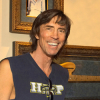Tom Scholz

Tom Scholz
Donald Thomas "Tom" Scholzis an American rock musician, inventor, engineer, and philanthropist, best known as the founder of the band Boston. He is also the inventor of the Rockman portable guitar amplifier. He has been described by Allmusic as "a notoriously 'un-rock n' roll' figure who never enjoyed the limelight of being a performer," preferring to concentrate almost exclusively on his music, and in more recent years, spending much of his time working with charities...
NationalityAmerican
ProfessionRock Singer
Date of Birth10 March 1947
CityToledo, OH
CountryUnited States of America
If you listen to my tapes, you'd hear 14 different ways to arrange the rhythm guitar behind the harmony vocal, and then 14 different ways with a different vocal. You'd have to really be a music lover to sit through that and find it entertaining. I enjoy it, but I'm easy to please.
I take chances. I don't limit myself. I don't think anybody who listens to Boston would have predicted hearing a female rapper on the beginning of the song 'Sail Away.' But that's what fit.
I can sit down at a piano or with a guitar and just chug away for hours and be perfectly content with whatever comes out. But when it comes to something that somebody else is going to listen to, then I do feel a great deal of pressure to do something that's exceptional, at least in what I consider to be at the limits of what I can do.
I don't listen to the radio in the car, and I do that because I don't want to be influenced.
The lyrics are always the last thing I do. I always have a recording of basic tracks and maybe some of the lead work. I'll sit back and listen to it, and I'll just concentrate on what kind of feeling it gives me. My goal writing the lyrics is to not disrupt that feeling.
Im a huge fan of Joe Walsh and a big James Gang fan. A lot of what I know about playing the guitar I learned from listening to him.
I'm never too ambitious when I go into the studio. I always know that I'm just going into the studio to work on or try to develop an idea that I have for a song.
I'm not one of those artists who doesn't want to play their most popular songs.
I'm one of those artists that doesn't actually hate my old hits. I love Boston music. I really like 'More than a Feeling.' After playing it to myself in a basement for such a long time, I'm happy to do it out on stage.
The whole experience of getting an album from an artist you like and listening to it from beginning to end is sort of gone. Now it's piecemeal.
The music that I wrote and recorded is music that I really enjoy listening to. It's just dumb luck that a lot of other people do, too.
The one thing I will say for digital, and you won't hear me say that many complimentary things about it, is that it's cheap. It pretty much enables anybody to record as long as you can deal with the sound.
Someone will say, 'Well, that's good enough.' As soon as I hear 'Good enough,' it really bothers me. I spend as much time as I think I can on anything I do. I try to do that with the people that work with me. I try to get the best out of them.
The studio work is the nasty, tedious, hard and nerve-wracking part, interrupted by moments of exhilaration. Playing live is the chance to actually have some fun and get on a stage.